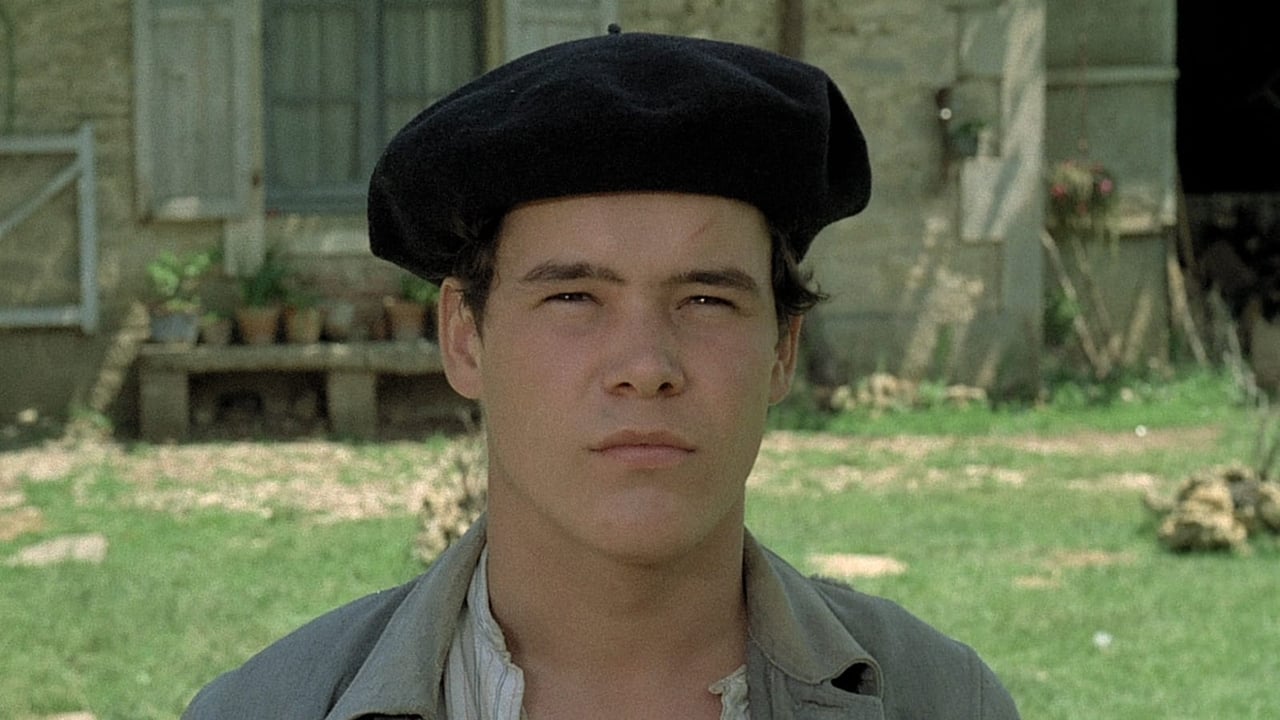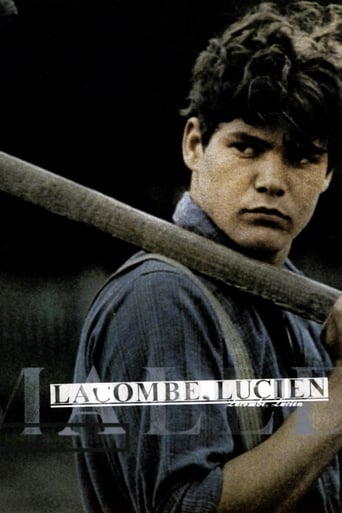

What makes it different from others?
... View Morejust watch it!
... View MoreA movie that not only functions as a solid scarefest but a razor-sharp satire.
... View MoreThis is a coming of age storyline that you've seen in one form or another for decades. It takes a truly unique voice to make yet another one worth watching.
... View MoreSometimes so-called great movies fail with certain audiences no matter how much we put ourselves into the experience and how many brilliant things we heard about them. Ingmar Bergman didn't like "Citizen Kane"; Robert Altman didn't like "Titanic", and I tried with all my best to appreciate the acclaimed "Lacombe Lucien" but it simply didn't work for me.The story: Pierre Blaise plays the title character, a French 18 year-old boy who joins the German police and the Nazists after been refused to work along with the French Resistance during WWII. Here's a guy with an ambition whatever that might be in his case, lots of initiative but no brain, no heart, no consideration for politics and his part in his country, doesn't fully understand what he's doing by betraying his own nation. And amidst of that he gets involved with a Jewish family, the father who works as a tailor, the mother, and the young daughter for whom Lacombe has a sexual relationship (don't even think on reading reviews out there saying that he's in love with her because he's not. She's the only cute girl in town, and he gets near her because of that but that doesn't means he loves her. Nothing in the movie says he's in love with her, he likes her, uses his power over her to not say a harsh word about his acts but to like someone doesn't always means you love someone).How come we could possibly care about someone who doesn't have any trace of idealism? How could I care about an ignorant, obnoxious, heartless, animal killer (for real, by the way), traitor of his country who didn't even bother of showing us why he does the things he does? I couldn't care at all! The whole time I expected something to happen, something that would reveal how wars change people for good and bad, and a possible reason of why Lucien is the way he is, but nothing happened. The only good soul of this film (and the great performance too) is the tailor played by Holger Löwenadler, he's the only wise guy here, the only one who isn't naive or ignorant to know what's going on, he managed to survive the war with his skills with clothes requested by the French who collaborates with the German police. But even his wisdom failed when he needed the most and things go wrong with him. Can we call Lacombe of innocent? I don't think so. His father was arrested by the Germans, the situation at his home wasn't good, he tried to be part of the French resistance and end up being a German officer, getting paid for that. He knows that there's a war, things are hard but he shouldn't be dumb enough to join the other side. If he wanted to do something about things he should act alone without taking sides, after all he had a gun. The only innocence move about Lucien is that he thought that killing rabbits would make him part of the Resistance, and that didn't work. When I was at Lucien's age, and even younger, I was fully aware about political conscience, what moral stands for and all but what Malle gives us here makes you wonder about this: if we were on Lucien's position would we be doing the same things? Only for a little bit of money, power and some life experience? It's intriguing. I watched "Lacombe Lucien" in a completely state of bewilderment in the sense of trying to discover what was the problem with this kid, I wanted motivations, reasons for what and why he did things. A voice-over would be nice, more dialogs of him, even if he had to talk with himself about things, something! Since the main actor followed a script and director's instructions I can't complain about his natural and realistic acting, after all he lived enough to make this film only, dying after a few months of the release (I really shouldn't say that, sad but truth, but nature claims what you do in taking real innocent lives. Quid pro quo, give and take).This is the first time that I disapprove a film directed by Louis Malle, he could make so much better here but we can't always like everything in the world. 4/10
... View MoreHaving been rejected by the Resistance for being too young, teenager Lucien Lacombe joins the Gestapo in a show of defiance. But upon falling for the daughter of a Jewish tailor, Lucien begins to view his actions in a very different light.Louis Malle was never a director to worry about public opinion, having ruffled feathers with his intellectual study of incest in 1971s, Soufflé au coeur, Le, he practically ostracised himself with this simmering collaboration piece. Tho it has to be said that the sheer weight of the fall out in his home country would surely have taken him by surprise, however, what remains to this day is a highly accomplished character piece that engrosses from the get go. It's now something of common knowledge that Malle drew from his own upbringing by way of motivation in some of his work, how much of this particular story affected him is not entirely clear, but what isn't in doubt is that the directors time during the occupation of France lends this piece an aura of honesty, it feels personal, and the result is very special indeed.Each individual viewer can interpret the sequence of events as they may, but just maybe Lacombe Lucien is a simple portrayal of a missed opportunity, and this missed opportunity coupled with naivety bred the wickedness that is viewed in the film. The theme of betrayal hangs heavy in the story, and the mere fact that Malle refused to take sides with his outlaying of the story, only furthers the sense of intrigue that covers the viewer come the stunning ending, an ending that creeps up on you and begs you for another thought process.Sadly, first time actor Pierre Blaise would perish in a road accident a year after Lacombe Lucien's release, his portrayal of the title character is truly wonderful and it leaves a truly fitting epitaph indeed. Lacombe Lucien is highly recommended cinema, uneasy and itchy at times for sure, but it's never less than masterful in its approach on either side of the camera. 9/10
... View MoreThis was a great film about a young man, Pierre Blaise,(Lucien Lacombe) who was raised on a farm in France and loved to kill animals, even birds singing in a tree. Lucien loved to catch chickens and kill without the blink of a eye and did the same thing with rabbits. That is basically how this film started out and it also took on many different directions. Lucien gets involved with the German's as they occupied France during WW II and joins the Nazi's as an informer and becomes deeply involved with a Jewish family. France Horn, (Aurore Clement) is a Jewish girl who Lucien falls in love with and her father is Albert Horn who is a tailor by trade and he does not like Lucien because he knows he is a turn coat for the German's who hate the Jews. This is a very interesting and mysterious film and has some very deep secrets that occurred during World War II.
... View MoreThis film invites us into its various fascinating plots--in the spirit of almost what is happening doesn't matter: a young French/Gesapo boy, Lucian, is crafted a suit by an celebrated, escaped Jewish tailor from Paris who is now living in Toulouse. The man has a nice apartment in Toulouse and he stays there with his mother and daughter.The boy falls in love with the daughter right away and ultimately demands her as his right. Things happen, The father's foolish action separates him from the family. Then, one day, the family is due to be picked up to go to the camps. The camera zooms in on the daughter and grandmother packing only one small bag eachLucien manages to kill the other man who has come to pick them up(the only barrier)--and he now escapes with the young Jewish girl and her grandmother-towards what? With what aim? Did they do the right thing? Did they take the right path? And those people in Toulouse mouthing those horrible things about the Jews--I understand that they weren't actors.What I can't put to rest here is the ending--everything here was on too grand a scale for me, alas. Let's see: If the father was sent to Toulouse by truck, then he most probably entered the transport system headed for the Belzec death camps. When the boy and girl and grandmother escape for a brief while (we are not told how long), they probably did enjoy a brief respite from life--but the movie ends there and they tell us that the boy was captured and killed. It tells us nothing of what happened to the girl and her grandmother, so we can imagine what we will.This film itself was sewn of a dream of a town and its people. But Toulouse, the town,--and its people and their attitudes--those have gone on. That I am sure of. I wonder how much they have actually changed?
... View More